Satellite, December 1956: A Retro-Review
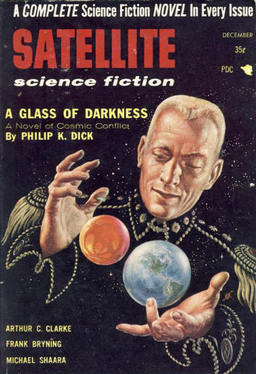 This is one of a great many ’50s digests. It began publication in October 1956 as a bimonthly, and became a monthly in 1959 for its last four issues (the last was May). 18 issues total. (Apparently the June and July issues were assembled at least to some degree.)
This is one of a great many ’50s digests. It began publication in October 1956 as a bimonthly, and became a monthly in 1959 for its last four issues (the last was May). 18 issues total. (Apparently the June and July issues were assembled at least to some degree.)
The publisher was Leo Margulies, and the editor for the first two issues was Sam Merwin, who had done good work with Startling Stories/Thrilling Wonder Stories.
According to the Science Fiction Encyclopedia, Margulies took over after that– although the ISFDB credits Cylvia Kleinmann for a number of the later issues. I tend to trust the SFE here, especially with Malcolm Edwards and Mike Ashley responsible for the entry.
That said, Kleinmann (Margulies’ wife) was also for a time editor of Mike Shayne’s Mystery Magazine (also published by Margulies) so very possibly she was the editor, or perhaps it was a collaborative effort, and, as Todd Mason notes, Margulies had a long history of fronting anthology projects (under his name) that were actually edited by others.
Frank Belknap Long edited the final four 1959 issues, which were letter-sized instead of digest.
For most of its run, Satellite featured “A Complete Novel in Each Issue” (according to the SFE, to compete with paperback novels). Based on the TOCs I’ve seen, these really were reasonable-length novels for the day – in the range of 40,000 words.
The December 1956 issue, the magazine’s second, has a promising TOC – stories by the likes of Philip K. Dick, Arthur C. Clarke, Gordon Dickson, Algis Budrys, and Michael Shaara among others. Indeed, the first few issues of the magazine were pretty promising, though it never really became a top market.
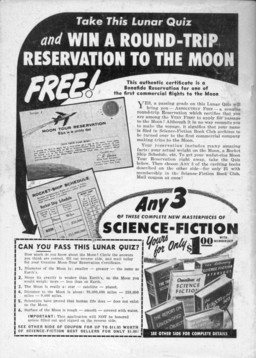 The cover is by Kelly Freas, illustrating Dick’s novel. Interiors are by Arnold Arlow.
The cover is by Kelly Freas, illustrating Dick’s novel. Interiors are by Arnold Arlow.
There are no real features (inside front cover does include some puffery from Margulies).
There are two ads: one for the Rosicrucians, and on the back cover (inside and out), the Science Fiction Book Club. That ad has an offer I’ve seen before – two “bonafide Moon-Tour reservations.” Anyone have any of those reservations?
Here’s the TOC:
Novel:
- “A Glass of Darkness”, by Philip K. Dick (41000 words)
Short Stories:
- “Poor, Hungry People,” by Frank Bryning (1,400 words)
- “Four-Billion Dollar Door,” by Michael Shaara (1,600 words)
- “The Man in the Iron Altogether,” by Dal Stivens (1,000 words)
- “Next of Kin,” by Algis Budrys (1,800 words)
- “The Reluctant Orchid,” by Arthur C. Clarke (3,600 words)
- “The Green Building,” by Gordon R. Dickson (2,500 words)
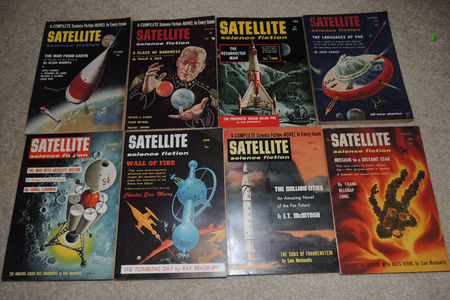
The little known writers here are a couple of Aussies… Frank Bryning and Dal (for Dallas) Stivens. Each is credited by the ISFDB with a couple of dozen stories, give or take – Stivens a little less, Bryning a little more. Stivens seemed to do a fair amount of ghost stories.
The short-short here is a trivial piece about a weakling who goes to a physical culture expert to become an “iron man”… literally, and with easily guessable results. Silly, indeed, but told in a sprightly enough fashion to fitfully hold the interest.
Bryning’s “Poor, Hungry People” takes on the old chestnut about aliens coming to a ruined Earth and trying to figure out what the dead humans were like… this time they note buildings labeled things like BANK contain lots of gold and they wonder if it is edible, or something.
I was more interested in the clever way Bryning named his aliens, a strategy I’ve also seen from a much superior Australian writer, Damien Broderick (in his first novel, which he later revised, eliminating I believe the silly names): they have names like Yknal and Ytrohs and Yttaf.
Michael Shaara’s “Four-Billion Dollar Door” is a bit silly too, about a man who spearheads a trip to the Moon, only to be stymied when he gets there by… well, you’ll have guessed it.
Dickson’s “The Green Building” is also rather minor, indeed quite a weak story from him – a local man running a restaurant next to a crashed alien deals with a reporter investigating the mystery… in the end there just didn’t seem to be any real point to the story.
“The Reluctant Orchid” is of course one of Clarke’s Tales from the White Hart, appearing just a month or so prior to the book. An orchid fancier browbeaten by his aunt comes into possession of a very curious specimen and gets an idea… but his animal-fancying aunt may have ideas of her own.
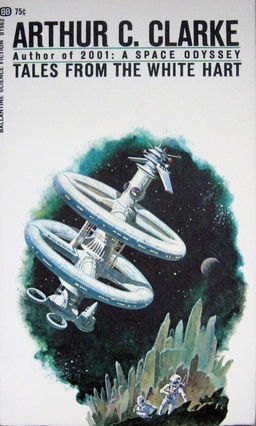 Cute but minor, and not to my mind one of the more interesting of the Harry Purvis stories.
Cute but minor, and not to my mind one of the more interesting of the Harry Purvis stories.
That leaves Budrys’ “Next of Kin” as the most ambitious (only ambitious?) short story here, as a man visits his brother after years away. The one brother has special powers, which the other one finds threatening, so he has come up with a way to deal with them… but this leaves him in rather a quandary.
I really wasn’t convinced – it’s typical Budrys, trying to force a moral issue, but in this case the forcing seemed too obvious.
So, in sum, a somewhat disappointing set of shorts – and noticeably a bunch of quite short short stories – squeezed, I suppose, by the “Complete Novel.”
So, as to that. “A Glass of Darkness,” retitled The Cosmic Puppets for its 1957 Ace Double appearance and all subsequent book reprintings (though it wasn’t reprinted in English until 1983 according to the ISFDB) was Dick’s fourth published novel. For me Dick hit his stride with Time Out of Joint, his sixth novel and first hardcover (Lippincott, 1959) – at any rate, that’s a novel I like a lot, and a novel that seems very much a Phil Dick novel.
However, I haven’t read all his early novels, and others tell me that Eye in the Sky (1957) is a better candidate for his first significant novel. Also, according The Divine Invasion, Lawrence Sutin’s biography of Dick, “A Glass of Darkness” was actually written in 1952/1953.
It opens with Ted Barton, a married man in his late 20s, heading to his rural boyhood home town, Millgate, on a whim, and very much against his wife’s wishes. But when he gets there, he finds the town changed beyond recognition. He becomes obsessed with discovering what happened, to the point that his wife leaves him.
He learns that “he,” or a version of him, died of scarlet fever in this Millgate, 18 years earlier. He encounters a rather sinister young boy, and an almost as sinister pre-pubescent girl (treated, oddly to me for a ’50s story, in a noticeably sexualized fashion).
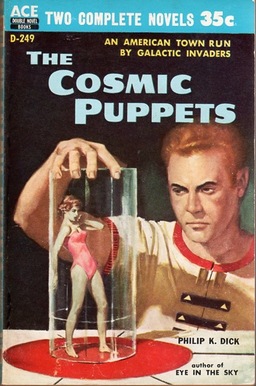 Slowly we learn that for the most part nobody every enters or leaves this Millgate, and that the two children, Peter and Mary, are engaged in some sort of battle, apparently as agents of two giants that live outside the town. What could be going on?
Slowly we learn that for the most part nobody every enters or leaves this Millgate, and that the two children, Peter and Mary, are engaged in some sort of battle, apparently as agents of two giants that live outside the town. What could be going on?
Then Ted meets a drunk who turns out to remember the old, “real,” Millgate – and Ted discovers in himself a special power, to restore the old town. How will the giants, and their child agents, react?
At times I was quite gripped by the mysteries here, but I found the solution kind of disappointing, and the resolution to the novel somewhat offputting. Also, very uncharacteristically for Dick, this novel, to me, qualifies as Fantasy.
(It’s fair to note that a number of Dick’s early short stories were also Fantasy, sometimes quite striking, but it seems to me that all his other novels, with the potential exception of his very strange last works [and of course the posthumously published mainstream novels], are best defined as Science Fiction.)
Dick ends up dealing, not very convincingly, with some major philosophical archetypes… You can see here that Dick was not at all your ordinary writer, but the story still just doesn’t work. There’s some really wobbliness of tone and direction, too – at times at the beginning Barton seems a fairly typical Phil Dick nebbish, but by the end he’s not that at all.
Not sure how much care went into this book, to tell the truth.
Rich Horton’s last retro-review for us was the December 1959 issue of Amazing Stories. See all of Rich’s retro-reviews here.
[…] been reprinted; the 1957 Ace Double paperback is considered the definitive edition. Rich Horton reviewed the issue for us, including A Glass of Darkness, in one of his retro-reviews last […]
[…] Horton’s last retro-review for us was the December 1956 issue of Satellite. See all of Rich’s retro-reviews […]